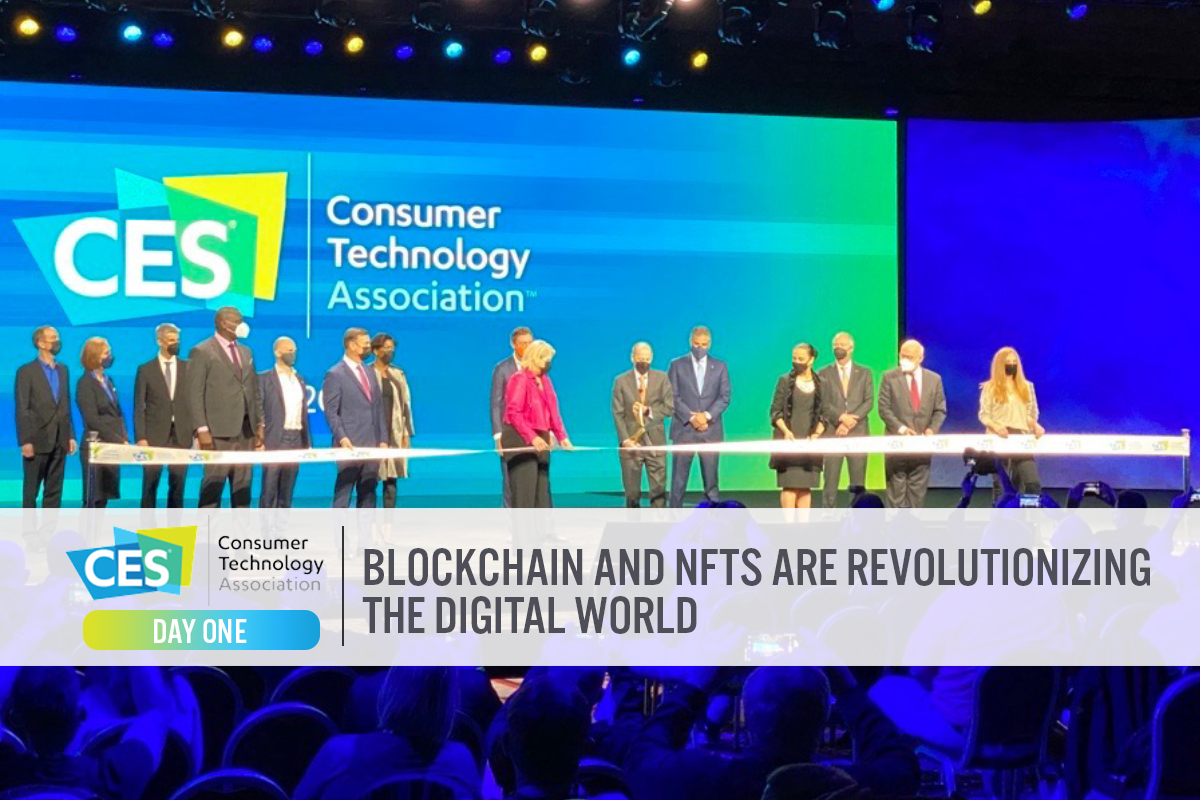
DIpil Das
The Coresight Research team is attending CES (formerly the Consumer Electronics Show) in Las Vegas, US, with the exhibits running during January 5–7, 2022. CES is one of the world’s largest trade shows, attracting 100,000 attendees in pre-pandemic years. This year, the show is still expecting roughly 2,100 exhibitors.
In this report, we present our top 10 insights from day one of the show on January 5.
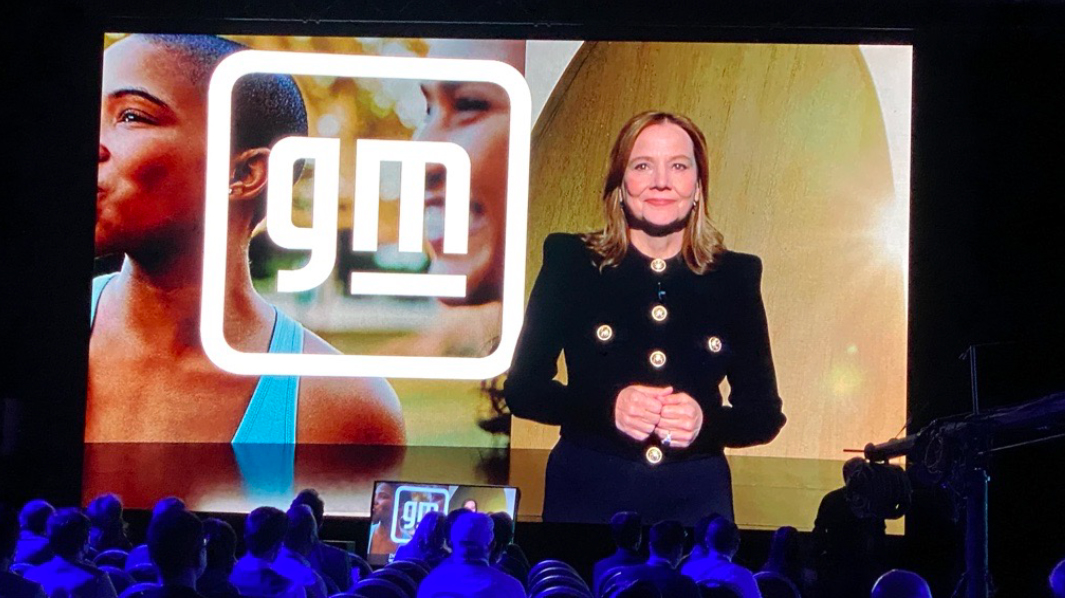 GM CEO Mary Barra
GM CEO Mary Barra
Source: Coresight Research [/caption] 5. Does Matter Matter? Samsung Thinks So Matter is an alliance for smart home technology that aims to connect the diverse technology ecosystems of Amazon, Apple, Google, Samsung SmartThings and Zigbee Alliance, with the goal of improving interoperability and reducing customer frustration around incompatibility. The standard is due to be ratified at the end of 2022. In its keynote presentation at CES, Samsung discussed the significance of the Matter alliance and announced the Home Connectivity Alliance (HCA), which includes heating and cooling equipment companies Arcelik, Electrolux, GE, Haier and Trane. Many of the trends we are seeing in smart home technology echo others discussed at CES, such as personalization and hyper-connectivity. Whereas the first generation of smart home devices enabled consumers to control their smart thermostats with a smartphone app, current technology iterations leverage data to personalize user experiences—for example, to determine temperature settings by energy usage restrictions, or turn lights on as the user arrives at their home based on communication with the vehicle they are traveling in. 6. WWE Partners Is Educating Its Fanbase on Blockchain WWE (World Wrestling Entertainment) is educating fans on NFT and blockchain technology as it releases a new line of NFT products for sale. WWE announced that it has partnered with Blockchain.com as a way to educate consumers on this new technology—paving the way to mass adoption. WWE will use its platform as the top sports brand on YouTube and TikTok to connect with its followers, in not just a bid for sales but also to disseminate information on the technology, according to the company. In 2021, the WWE rolled out NFTs featuring two of its famous wrestling stars, The Undertaker and John Cena. 7. French Tech Still Dominates at CES The French contingent is the largest national section within the Eureka Park section of the Venetian Convention Center at CES, with around 150 participants in attendance. French innovators have had a strong presence at CES since 2015, with tech startups receiving significant support from the French government to get ahead. Notable innovations we saw included: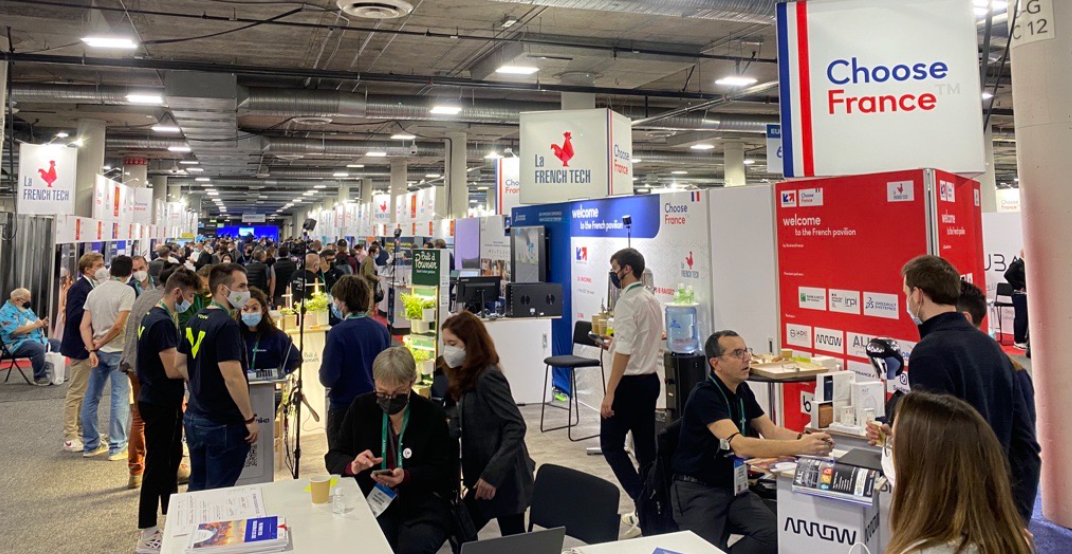 The French section at CES
The French section at CES
Source: Coresight Research [/caption] 8. Israeli Innovators Made a Strong Showing Despite New Travel Restrictions Several Israeli innovators persevered and made it to the show, despite the US requiring special permission for travel due to a surge in Omicron cases. [caption id="attachment_138987" align="aligncenter" width="700"]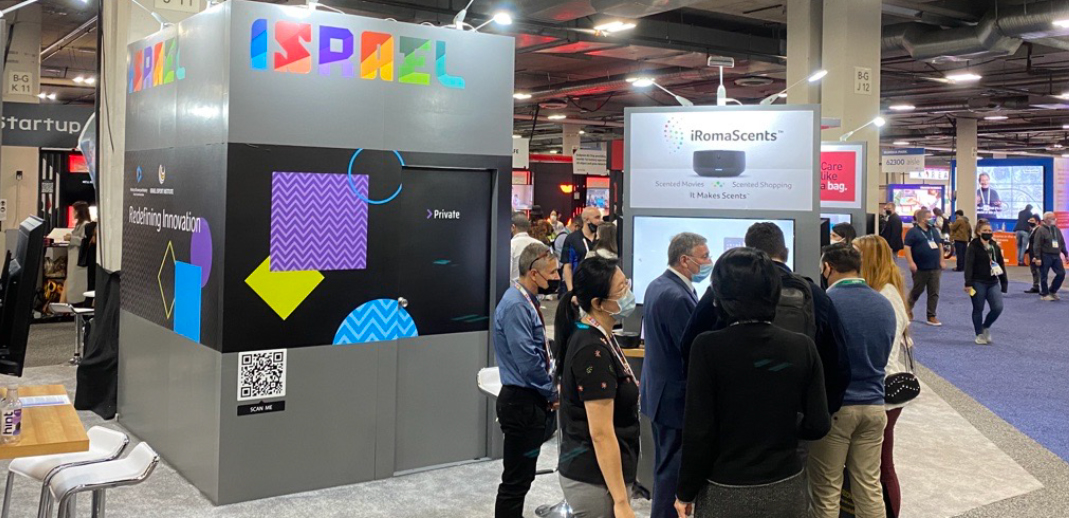 The Israel Pavilion at CES 2022
The Israel Pavilion at CES 2022
Source: Coresight Research [/caption] We met two interesting innovators at The Pavilion: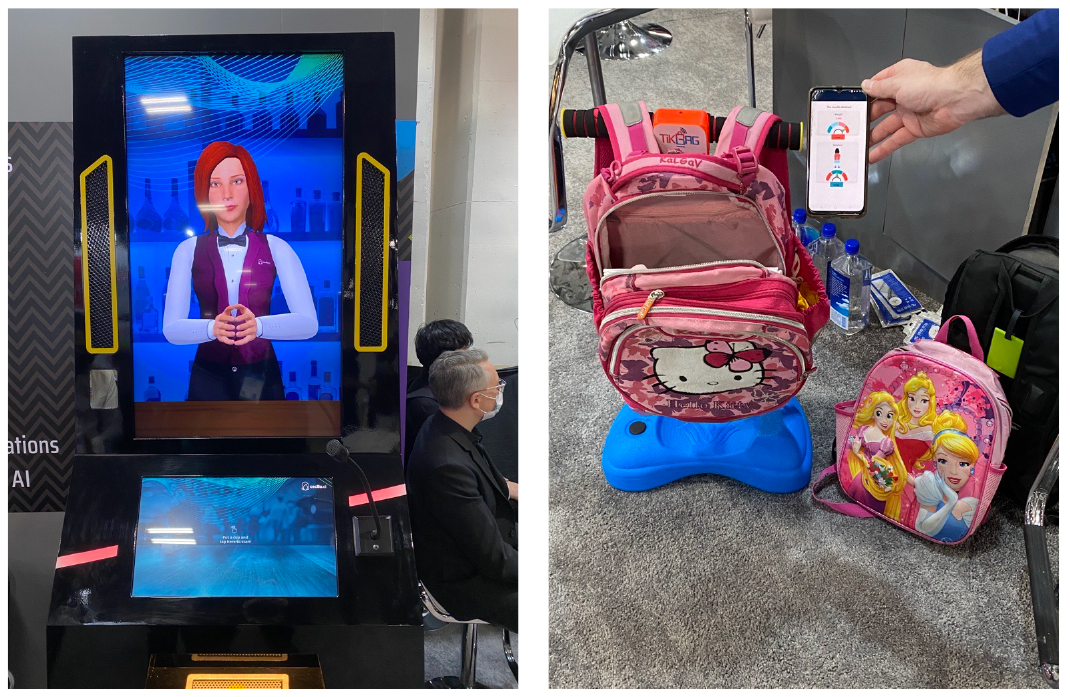 Cecelia.ai’s virtual bartender (left), TikBag’s smart backpack system (right)
Cecelia.ai’s virtual bartender (left), TikBag’s smart backpack system (right)
Source: Coresight Research [/caption] 9. AI Has Work To Do Before Bias-Free Data Simulation AI (artificial intelligence) technology has much to learn before it even begins to address diversity and other critical ethical issues with respect to data simulation, according to Daniela Braga, Founder and CEO of online marketplace for AI tools Defined AI, and Rob Meadows, CEO of ethical AI company AI Foundation. The two panelists discussed how to use AI to create a diverse workforce and an inclusive world. To prevent unconscious bias, or an automatic shortcut used to process information, AI should depend on steadily bigger data. However, many AI platforms still find data expensive, amid a shortage of talent, according to the speakers. Should these shortages persist, using AI to achieve diversity and equity will remain a long-term goal. 10. Wagz Expands Communication Between Dogs and Owners The freedom smart collar offered by Wagz is designed to enable dog owners to communicate with their dogs more efficiently. The electric collar is similar to the one a dog might wear when in a backyard with an electric fence—the catch is that, with Wagz, there is no need for the electric fence. An owner can send harmless signals to the dog collar to punish undesirable behavior via an app on their smartphone. The company claims that its GPS tracking feature allows owners to bring their dogs to public spaces or other people’s houses without worrying about constantly monitoring behavior or restricting their movement with fences or cages.
CES 2022 Day One: Coresight Research Insights
1. Blockchain Will Build Web 3.0 The consensus at CES 2022 is that blockchain technology is the foundation for building Web 3.0—the third version of the internet, which allows users to have greater control over their data. Blockchain technology is an electronically distributed ledger digital record, which eliminates the need for manual processing and authentication by intermediaries. Furthermore, individuals are not able to alter data stored in blockchain without alerting the entire system, making data storage extremely secure. In Web 3.0, instead of having usernames and passwords as login details, users will have a unique digital footprint hosted via their cryptowallets, which will be used as an access token to websites. 2. NFTs Are Revolutionizing the Art World NFT (non-fungible token) was a buzzword in 2021 that will trend in 2022. NFTs use blockchain technology to produce a “digital serial number,” as described by Erick Calderon, CEO and Founder of NFT artwork platform Art Blocks. In other words, an NFT gives a buyer digital ownership of a product. As such, NFTs are revolutionizing the art industry by making art more “investible” according to Vlad Ginzburg, CEO of Web 3.0 tools provider Blockparty. The use of NFTs allows artists to connect directly with collectors, rather than having to use art galleries as an intermediary. In this way, digital auction houses make art transactions both more visible and liquid for buyers and sellers. NFT collectors can buy a digital artwork, allow it to appreciate, and then resell it at a profit—similar to stock trading. 3. “Smart Contracts” Enable Artists To Profit in Perpetuity The evolving digital world is revolutionizing the way artists profit from sales of their work. In a physical artwork sale, an artist typically signs a contract with a gallery to sell their artwork, and profits only from the initial sale of their artwork. However, with a ‘smart contract,’ artists can continue to profit and be recognized from the resale of their digital work. ‘Smart contracts’ are encrypted with Blockchain technology to guarantee that artists gain royalties whenever their artwork is resold as an NFT in a secondhand marketplace. This allows artists to profit every time their digital artwork is sold, further revolutionizing the art industry not just for consumers, but for creators as well. 4. GM Is Focusing Sustainability Initiatives on Electrical Delivery Vehicles Mary Barra, CEO of automotive manufacturing company GM, gave a virtual address to attendees on CES Day One, outlining the company’s sustainability goals—including its focus on electric vehicle technology. Barra stated that GM aims to become a carbon-neutral business. The company has announced agreements with FedEx and Walmart on electric delivery vehicle fleets. The two partners will use GM’s BrightDrop vehicle, which feature proprietary ultium battery technology and the company’s Ultifi software platform. Barra explained that FedEx sees the vehicles as a solution to labor shortages, congestion and to achieving its own carbon-emission goals. Walmart CEO Doug McMillon announced at CES that the company plans to use GM’s vehicles for its home-delivery service and stated that it had invested in GM’s electric passenger vehicle company, too. Barra also discussed the launch of GM’s new Silverado pickup truck and previewed upcoming electric vehicle launches. [caption id="attachment_138985" align="aligncenter" width="700"] GM CEO Mary Barra
GM CEO Mary Barra Source: Coresight Research [/caption] 5. Does Matter Matter? Samsung Thinks So Matter is an alliance for smart home technology that aims to connect the diverse technology ecosystems of Amazon, Apple, Google, Samsung SmartThings and Zigbee Alliance, with the goal of improving interoperability and reducing customer frustration around incompatibility. The standard is due to be ratified at the end of 2022. In its keynote presentation at CES, Samsung discussed the significance of the Matter alliance and announced the Home Connectivity Alliance (HCA), which includes heating and cooling equipment companies Arcelik, Electrolux, GE, Haier and Trane. Many of the trends we are seeing in smart home technology echo others discussed at CES, such as personalization and hyper-connectivity. Whereas the first generation of smart home devices enabled consumers to control their smart thermostats with a smartphone app, current technology iterations leverage data to personalize user experiences—for example, to determine temperature settings by energy usage restrictions, or turn lights on as the user arrives at their home based on communication with the vehicle they are traveling in. 6. WWE Partners Is Educating Its Fanbase on Blockchain WWE (World Wrestling Entertainment) is educating fans on NFT and blockchain technology as it releases a new line of NFT products for sale. WWE announced that it has partnered with Blockchain.com as a way to educate consumers on this new technology—paving the way to mass adoption. WWE will use its platform as the top sports brand on YouTube and TikTok to connect with its followers, in not just a bid for sales but also to disseminate information on the technology, according to the company. In 2021, the WWE rolled out NFTs featuring two of its famous wrestling stars, The Undertaker and John Cena. 7. French Tech Still Dominates at CES The French contingent is the largest national section within the Eureka Park section of the Venetian Convention Center at CES, with around 150 participants in attendance. French innovators have had a strong presence at CES since 2015, with tech startups receiving significant support from the French government to get ahead. Notable innovations we saw included:
- BeFC—Active sensor tags powered by biofuels
- Ceartis—A biological control system that protects crops from pests
- Chargepoly—Rapid charging stations for electric vehicles
- Finz—A platform to support investors in sustainable projects
- Otonohm—A portable and more efficient system to replace traditional power supplies and inverters
- Urban Canoper—Structures designed to facilitate plant growth to reduce outside temperatures
 The French section at CES
The French section at CES Source: Coresight Research [/caption] 8. Israeli Innovators Made a Strong Showing Despite New Travel Restrictions Several Israeli innovators persevered and made it to the show, despite the US requiring special permission for travel due to a surge in Omicron cases. [caption id="attachment_138987" align="aligncenter" width="700"]
 The Israel Pavilion at CES 2022
The Israel Pavilion at CES 2022 Source: Coresight Research [/caption] We met two interesting innovators at The Pavilion:
- Cecelia.ai—A robotic bartender that mixes drinks, tells jokes, makes recommendations and can respond to voice commands.
- TikBag—A tech-powered backpack system for schoolchildren. The system ensures that children bring the right items to school, avoiding forgotten items—as well as checking that their backpack is balanced and not too heavy, among other tech features.
 Cecelia.ai’s virtual bartender (left), TikBag’s smart backpack system (right)
Cecelia.ai’s virtual bartender (left), TikBag’s smart backpack system (right) Source: Coresight Research [/caption] 9. AI Has Work To Do Before Bias-Free Data Simulation AI (artificial intelligence) technology has much to learn before it even begins to address diversity and other critical ethical issues with respect to data simulation, according to Daniela Braga, Founder and CEO of online marketplace for AI tools Defined AI, and Rob Meadows, CEO of ethical AI company AI Foundation. The two panelists discussed how to use AI to create a diverse workforce and an inclusive world. To prevent unconscious bias, or an automatic shortcut used to process information, AI should depend on steadily bigger data. However, many AI platforms still find data expensive, amid a shortage of talent, according to the speakers. Should these shortages persist, using AI to achieve diversity and equity will remain a long-term goal. 10. Wagz Expands Communication Between Dogs and Owners The freedom smart collar offered by Wagz is designed to enable dog owners to communicate with their dogs more efficiently. The electric collar is similar to the one a dog might wear when in a backyard with an electric fence—the catch is that, with Wagz, there is no need for the electric fence. An owner can send harmless signals to the dog collar to punish undesirable behavior via an app on their smartphone. The company claims that its GPS tracking feature allows owners to bring their dogs to public spaces or other people’s houses without worrying about constantly monitoring behavior or restricting their movement with fences or cages.